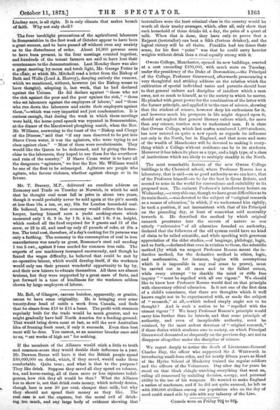The four - torchlight processions of the agricultural. labourers Somersetahire in
the first week of October appear to have been agreat success, and to have passed off "without even any anxiety as to the disturbance of order. About 16,000 persons seem to have been present, in the four meetings counted together, and hundreds of, the tenant farmers are said to have lent their countenance to thademonstrations. Last Monday there was also a pest meeting._ by, moon and torch light, Mr. George Potter in the chair, at which Mr. Mitchell read a letter from the Bishop of Bath and. Wells (Lord A. Hervey), denying entirely the rumour, -which we mentioned, without, however (as the Bishop seems to have thought), adopting it, last week, that he had declared against the Unions. He did declare against " those who set the rich against the poor and the poor against the rich," " those who set labourers against the employers of labour," and " those who run down the labourers and excite their employers against them,"—which was very impartial and just condemnation. It is curious enough, that during the week in which these meetings were held, the horse-pond speech was repeated in Somersetshire, at the dinner of the Marshwood ploughing match, when the Rev. Mr. Williams, answering to the toast of the " Bishop and Clergy of the Diocese," said that "if any men deserved to be put into Shave Cross water, it was the agitators, who were trying to set class against class." " Most of them were revolutionists. They would like the Queen, to be dethroned, and by giving the fran- ohise to the labourers, they hoped to use them for the overthrow and ruin of the country." If Shave Cross water is to have all the dangerous "agitators," we fear the Rev. Mr. Williams would be one of the first to be submerged. Agitators are people who agitate, who favour violence, whether against change or in its -favour.


































 Previous page
Previous page